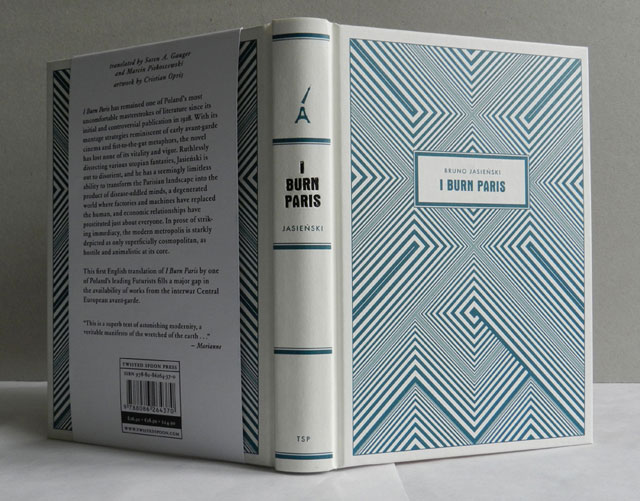
The novel was written by Jasieński in retaliation to a frivolous novella from Paul Morand, who spent time as a French diplomat in Moscow. That Je brûle Moscou / I Burn Moscow in French was considered by Jasieński a mockery of the world’s proletarian capital, and he was determined to strike back. The publication of the subversive I Burn Paris in fact led to Jasieński’s deportation from Paris.
In her recent review for the Times Literary Supplement, Marci Shore states:
While much has by now been written about the relationship between the avant-garde and Stalinist literature, Jasieński's I Burn Paris reveals a still largely forgotten moment: post-avant-garde and pre-Socialist Realist. Aesthetically, the moment was a fantastical one: quasi-Surrealist, hallucinogenic, and grotesque.
The novel tells the story of a disgruntled factory worker who, finding himself on the streets, takes the opportunity to poison the French capital’s water supply. As victims grow in numbers, we encounter Chinese communists, rabbis, disillusioned scientists, embittered Russian émigrés, French communards and royalists, American millionaires and a host of others as the city sections off into ethnic enclaves and everyone plots their route of escape. At the heart of the cosmopolitan city is a deep-rooted xenophobia and hatred — the one thread that binds all these groups together. As Paris is brought to ruin, Jasieński issues a rallying cry to the downtrodden of the world, mixing strains of The Internationale with a broadcast of popular music.
With its montage strategies reminiscent of early avant-garde cinema and fist-to-the-gut metaphors, I Burn Paris loses none of its vitality and vigor when read today. Ruthlessly dissecting various utopian fantasies, Jasieński is out to disorient, and he has a seemingly limitless ability to transform the Parisian landscape into the product of disease-addled minds. An exquisite example of literary Futurism and Catastrophism, the novel presents a filthy, degenerated world where factories and machines have replaced the human and economic relationships have turned just about everyone into a prostitute. Yet rather than a clichéd simplistic propaganda, there is an immediacy to the writing, and the modern metropolis is starkly depicted as only superficially cosmopolitan, and in reality hostile and animalistic at its core.
This English translation of I Burn Paris fills a major gap in the availability of works from the interwar Polish avant-garde, an artistic phenomenon receiving growing attention with recent publications such as Ms. Shore's Caviar and Ashes. Her book was released in 2006, and it tells the story of Polish writers in the era between the two World Wars, enchanted with communist ideology. Among the protagonists of the story are the activist poets Władysław Broniewski, Aleksander Wat and Bruno Jasieński.
I Burn Paris features an introductory note written by Anatol Stern and an afterword by the translator Soren A. Gauger. Another novel from Jasieński which has previously appeared in English is The Mannequins' Ball (Routledge, 2000). In 2013, the Czech-based publishing house Twisted Spoon, founded by two Americans, plans to release Jasieński’s The Legs of Izolda Morgan.
Bruno Jasieński (1901-1938) rose to fame at 20 as a poet, and the author of avant-garde verse that introduced the futuristic trend to Poland. His poems, such as the But w butonierce / The Shoe in the Buttonhole and Marsz / The March shocked readers as the author employed phonetic spelling and broke with any orthographic rules. Jasieński was a revolutionary and a futurist both in his use of language and in the actual content of his writings.
Following repression from the police and censorship, he fled to France in 1925. After his expulsion, he stayed in the Soviet Union until 1929. Towards the end of the 1930s, Bruno Jasieński was charged with "ideological alienation" and would find no more freedom in his life. He is believed to have been executed and buried in a mass grave near Moscow. In his article, Piotr Mitzner writes that according the NKVD files Jasieński was executed on the 17th of September 1938.
I Burn Paris
by Bruno Jasieński
translated from the Polish
by Soren A. Gauger & Marcin Piekoszewski
artwork by Cristian Opriș
Twisted Spoon Press, Praga 2012
ISBN 978-8086264370
135 x 190, 309 pgs, hardcover
e-book: ISBN 978-8086264752
Editor: Paulina Schlosser
Source: www.twistedspoon.com, www.polishculture.org.uk